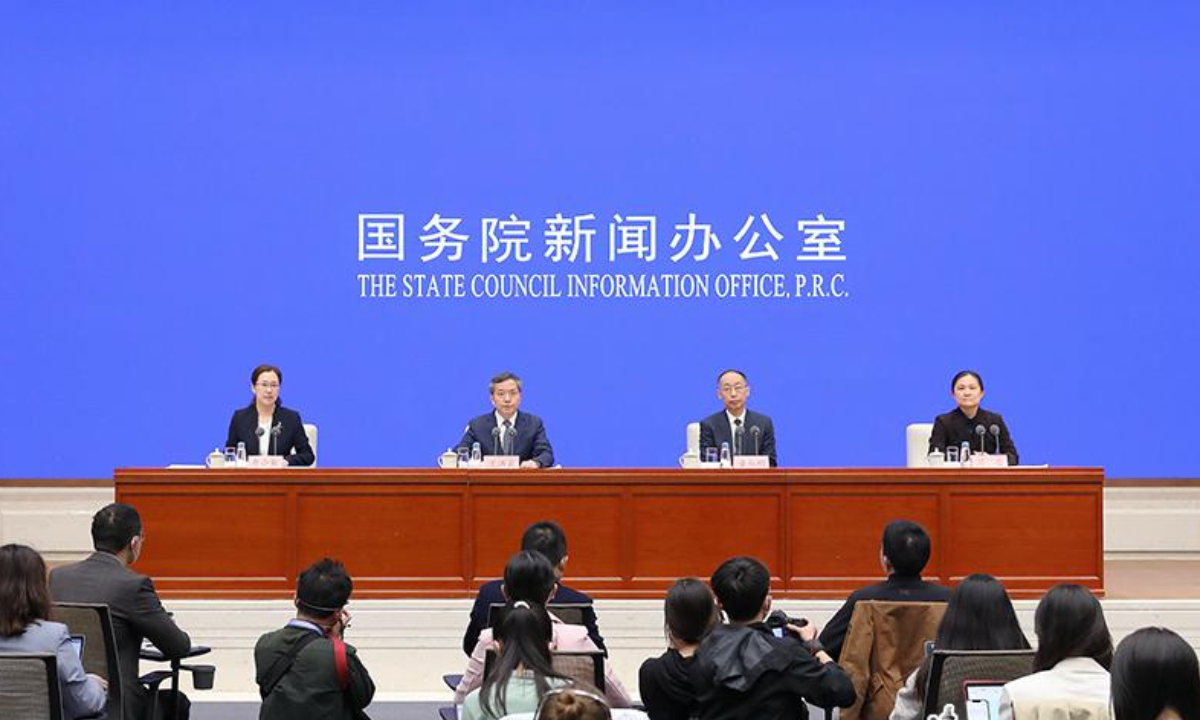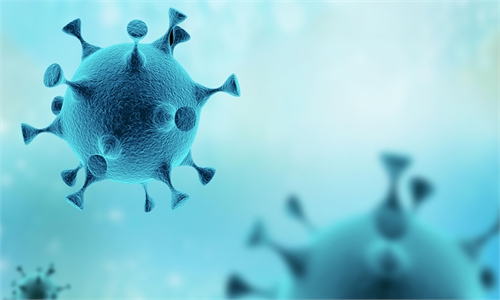Virus not found in animal samples of Huanan Seafood Market; strains isolated from environment samples most likely from humans: scientists

A photo of the news conference held by China's State Council's Information Office on April 9, 2023. Photo: china.com.cn
A Chinese Center of Disease Control and Prevention (CDC) researcher on Saturday said she felt surprised that some officials at WHO accusing China of lack of transparency in COVID-19 origins-tracing, as Chinese scientists have shared all available information and the results have been approved by WHO-China joint mission.
"If such presumptuous accusations persist, WHO's credibility could be undermined," the expert from China CDC said.
The remarks were made at a news conference held by China's State Council's Information Office on Saturday.
At the press conference, Chinese scientists discussed their latest findings in the origins-tracing of COVID-19, which showed that virus strains found in samples from the Huanan Seafood Market are more likely to have come from humans. Additionally, experts stated that no COVID-19 antibodies were detected in the blood of donors in Wuhan prior to the outbreak in December 2019.
The experts also refuted reports of Chinese researchers deleting data from GISAID platform, and provided a detailed summary of the latest research result showing that the COVID-19 was unlikely to have come from animals.
Certain Western media reports quoted a number of WHO officials as saying that China had failed to disclose data over COVID-19 origins-tracing. In response to these claims, Zhou Lei, a researcher from the Chinese CDC said during Saturday's news conference that as a Chinese scientist who had taken part in the China-WHO joint origins-tracing in 2021, she is actually surprised at these remarks.
During the joint origins-tracing, Chinese scientists shared all data and information, including information on more than 76,000 early cases of possible and suspected COVID infections in Wuhan, Zhou said.
"We conducted in-depth joint analysis and research, and the results were collectively approved by the WHO and Chinese experts at that time," she said.
Zhou noted that WHO is a very important organization, an authoritative professional body recognized by the international community, and its scientific nature, rigor and impartiality are beyond doubt.
"I think if such a presumptuous accusation is made, it is the WHO's credibility that risks being damaged," she said.
Offering details of the origins-tracing research, according to genetic sequencing of over 1,300 samples collected at the Huanan Seafood Market from January to March 2020, all animal samples, about 400, tested negative for COVID-19, according to Tong Yigang, dean of College of Life Science and Technology of Beijing University of Chemical Technology and group leader of the Chinese Animals and Environment team of the WHO-China Joint Mission on SARS-CoV-2 origin study.
The three strains of virus isolated from more than 900 environmental samples were almost identical to the patients' virus sequence at that time, suggesting that these strains of virus likely came from humans, Tong said.
Meanwhile China has conducted testing of stored sera from healthy blood donors prior to the emergence of COVID-19 cases in Wuhan, having tested 43,850 blood samples donated by 30,000 people, Zhou noted. The results showed that no antibodies linked to COVID-19 were detected in these blood donors from Wuhan before December 2019.
This results also echo the common finding in the phase I of WHO-China joint origins-tracing mission that no early cases were detected locally in Wuhan prior to December 2019, she said.
Regarding the "laboratory leak theory" that some US politicians and Western media have been hyping, Zhou said that during the previous joint tracing mission, the scientists had studied the possibility of a laboratory leak in a scientific and comprehensive manner.
According to the report jointly released by WHO and China in 2021, a laboratory leak was determined to be highly unlikely.
"We organized a joint expert team to visit a number of laboratories in Wuhan to investigate and study, and also shared all the health monitoring and possible clinical information of all laboratory personnel, and completed an investigation and analysis," Zhou said.
The experts also said that Chinese researchers have never deleted data uploaded on GISAID collected from the Wuhan Huanan Seafood Market, contrary to reporting by certain media outlets. Instead, the data access link has always been in the database, but was prematurely released by GISAID staff to the public.
The CDC research team submitted a draft of a paper to Nature in February and uploaded related data on to the GISAID platform for reviewer access only, explained Shen Hongbing, director of Chinese CDC on Saturday. However, this data was released to the public without the research team's knowledge, which GISAID explained as an operational error.
"We also want GISAID to clarify the situation to the media and WHO," Shen said, adding that the data had been officially released after the paper was published on April 5.
Global Times


